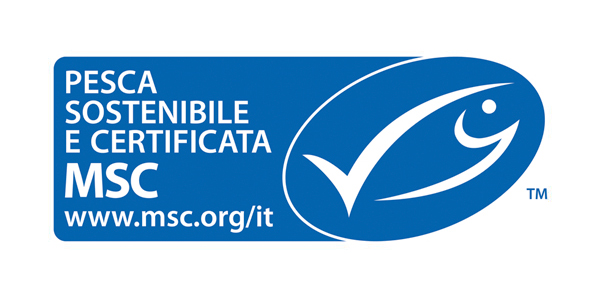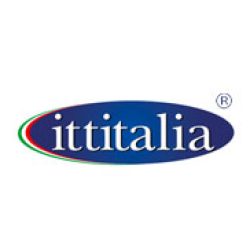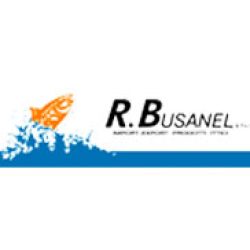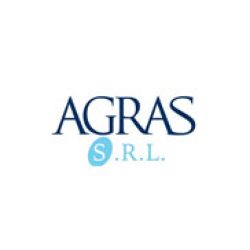
CERTIFICAZIONE MSC™ – Marine Stewardship Council™
The Marine Stewardship Council™ (MSC™) is an international non-profit organization, founded in 1997 to address the problem of unsustainable fishing and to conserve fish and seafood stocks for the future.
The MSC certification is the main global seafood certification scheme for sustainable fishing at international level. It is a voluntary certification open to all companies involved in fishing. It is based on a sustainable fishing Standard and a traceability mechanism for fish products. The system contributes in a responsible way to better management and conservation of fish stocks worldwide.
The Marine Stewardship Council has developed two different Standards, the first for fishing companies and the second for companies that process and/or market MSC-certified seafood products and must therefore ensure product traceability along the chain of custody.
- The MSC Sustainable Fisheries Standard certifies fish stocks and is based on three main principles (and 31 criteria) concerning the preservation of fish stocks, the impact of fishing operations and compliance with regulations. The certified organisation must demonstrate that it implements good management practices ranging from monitoring activities to assessing impacts. The fisheries certification process is a public process, managed by highly qualified and experienced auditors. For further information, please visit www.msc.org.
- The MSC Chain of Custody Standard guarantees the traceability of MSC-certified seafood products (fish, shellfish, molluscs, etc.) throughout the product processing, processing and distribution chain All companies in the chain that intend to handle or sell MSC-certified fished products must hold a Chain of Custody certificate. The MSC and ASC (for sustainable aquaculture) certification schemes share the same chain-of-custody Standard. This allows companies to manage a double certification in a convenient and practical way by following the rules of a single Standard.
Thanks to the Chain of Custody, the end product can be labelled and consumers can choose fish products (fish, shellfish, molluscs…) caught in a sustainable and responsible manner.
The MSC certification scheme is third-party. Vireo is an independent certification body accredited by ASI (Assurance Services International) to conduct audits and issue MSC certificates (ASI-ACC-086).
FAQ
How long does a MSC certificate last?
MSC certificates are valid for 3 years with an annual inspection.
What is the certification process like?
When the company is ready, Vireo plans a first certification audit (Main Assessment). In this phase all the information is collected and, if everything is in order, the certificate is issued a few days later. The company must indicate the MSC certified fish species and the certified suppliers that have been identified.
What are the main aspects of the coc standard?
The Standard consists of five principles.
- Certified products must be purchased from certified suppliers
- Certified products must be identifiable
- Certified products must be kept separate
- Certified products must be traceable and volumes must be recorded
- The organization must have a management system.
The main aspects are registration (traceability) and correct identification and separation.
Which businesses need certification?
All enterprises who acquire legal ownership of the MSC product, even without physical possession, and want to resell it as such should be certified Some specific exceptions to this general rule are described in the MSC Chain of Custody Standard.
Are the msc standard and the asc standard the same?
Yes, both MSC and ASC schemes share the same Chain of Custody Standard. Companies can therefore opt for a dual MSC and ASC certification.
Is there a cost associated with using the MSC brand?
Yes, there is a cost to using the MSC brand. Management is the responsibility of MSC International. Yes, there is a cost to using the MSC brand. Management is the responsibility of MSC International. whereas the costs can be found on the page“Cost to use the MSC label”.
What are the principles on which the msc standard of sustainable fisheries is based?
- Principle 1: Sustainability of the fish stock
The fishing activity must be carried out in compliance with the sustainability of the existing fish stocks. Any certified fishing company must operate ensuring the conservation of species and avoiding the overfishing of stock.
- Principle 2: Minimal environmental impact
Fisheries must preserve the structure, productivity, functions and diversity of the ecosystem.
- Principle 3: Effective Management
Companies in the seafood sector must comply with all local, national and international laws and regulations, setting up a management system that allows them to adapt to changing circumstances and ensure sustainability.
Which version of the Chain of Custody Standard is currently in effect?
Starting from 28 September 2019, the MSC Standard in force is version 5. The Standard is freely available on the MSC international website or on the download section of our website.
What are the main changes introduced by the new MSC Chain of Custody Standard?
The new Chain of Custody Standard has made several small changes in various aspects, both technical and procedural. The body and structure of the standard, however, remained the same, and therefore many requirements remain the same. The main changes that were introduced are:
- The need for certain companies to carry out third-party audits to verify the legality of working conditions on site. This additional audit is required for those organisations that process and/or repackage products and are located in a country that is considered a high risk according to recognised international reports. Italy is not currently considered a country at risk and for this reason this additional audit is not mandatory for companies based in Italy
- All certified organizations must have a system in place to assure that claims of certified product species, catch area or origin are accurate
- The need to use the MSC database to verify the validity of supplier certificates is made explicit.
For any further details
Chain of custody standard
The MSC and ASC chain of custody certification guarantees the traceability of MSC certified seafood products. It is based on a Standard of traceability and segregation that is applicable to the entire production chain. Chain of custody is based on some general aspects such as:
- The definition of roles and responsibilities,
- verification of MSC or ASC raw material supplies
- Proper segregation of raw material in the warehousing stages and in the processing and manufacturing stages
- Records management (input quantities, processed, transformed, etc.)
- sale and labeling of finished product
The focus of certification is therefore to pursue the non-mixing of MSC or ASC product with non-certified product. I certificati MSC e ASC per la Catena di Custodia hanno una validità di 3 anni. Durante questo periodo l’operato delle aziende deve essere esaminato per verificare che continuino a rispettare gli Standard MSC e ASC. After 3 years the company must be completely reexamined if it wishes to remain in the MSC and ASC program.
Only certified companies can put the MSC or ASC mark on certified products and also use it for promotion. The MSC and ASC logos are registered trademarks whose use is granted, subject to payment of fees, by MSC International.
The MSC label on the product means that the fish comes from sustainable fisheries, while ASC-labeled products come from responsible fish farms.
Downloads

MSC CHAIN OF CUSTODY STANDARD (VERSION 5)

MSC CERTIFICATION PROCESS GUIDELINE (EN)

DISPUTES AND CONFLICTS PROCEDURE – COMPLAINTS AND APPEALS PROCEDURE
TESTIMONIES

ITTITALIA SRL
MSC and ASC certifications for Ittitalia means giving consumers greater awareness in choosing the seafood they buy. Thanks to Vireo we are taking the first steps to be able to achieve this goal. For us, Vireo stands for professionalism, competence, courtesy and helpfulness of the staff.

R.BUSANEL & F.LI SRL
We are very satisfied with the cooperation with Vireo, with whom we prepared and obtained MSC and ASC certifications in a short time, thus giving prompt response to market needs.

STARLAKS ITALIA SRL
We began working with Vireo to achieve MSC chain-of-custody certification. Now we have again chosen Vireo’s expertise and professionalism to obtain ASC certification. Highly competent staff, professional and available for clarification or insight.

AGRAS SRL
We met Vireo in 2013 when we were among the first in Italy to believe in MSC certification. Since then helpful and competent professionals have been certifying our company in the MSC chain of custody.





